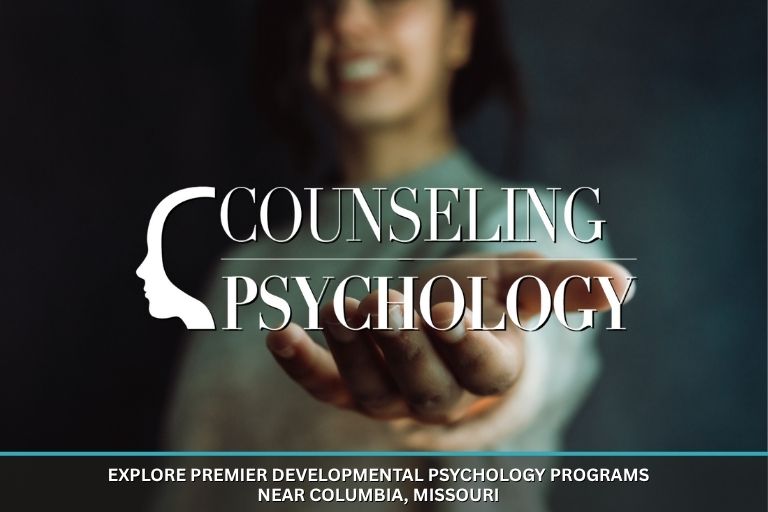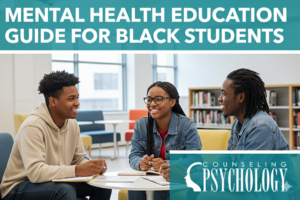Explore Premier Developmental Psychology Programs Near Columbia, Missouri

Missouri's mid-state academic hub, Columbia, is increasingly recognized for more than its central location, it’s a growing destination for students pursuing psychology careers with a developmental focus. Nestled between Kansas City and St. Louis, Columbia offers a blend of vibrant campus life, affordable living, and access to nationally regarded universities with specialized training in developmental psychology.
Developmental psychology is a rapidly growing field, with the U.S. Bureau of Labor Statistics projecting a 6% job growth for psychologists through 2032. As interest grows in lifespan development and early intervention, programs in this discipline are becoming essential across education, healthcare, and public policy. Columbia's proximity to research institutions and its focus on behavioral health innovation make it an ideal setting to launch or grow a career in this dynamic field.
Below, explore leading developmental psychology programs near Columbia, MO, from undergraduate preparation to doctoral-level research, along with insights into fieldwork opportunities, faculty strengths, and next steps to help shape a successful future.
2026 Premier Developmental Psychology Programs Near Columbia, Missouri
Central Methodist University-College of Graduate and Extended Studies
Fayette, MO - Private 4-year - centralmethodist.edu
Bachelor's - Bachelor of Arts or Bachelor of Science in Psychology (Developmental Psychology)
Campus Based - Visit Website
Central Methodist University's Developmental Psychology program offers a comprehensive Bachelor's degree emphasizing research and practical skills. Students engage with diverse psychological domains, including biological, applied, counseling, and developmental perspectives. The rigorous curriculum spans 120 credit hours, integrating general education and specialized psychology coursework. With a robust 24-30 hour psychology major component and mandatory senior thesis, students develop advanced analytical capabilities. The program prepares graduates for advanced academic pursuits or professional psychology careers, providing a solid foundation in understanding human psychological development through comprehensive, multidisciplinary training. Prospective students should review ACT/SAT entrance requirements during the admissions process.
- Min. 120 hours
- Campus program
- Developmental Psychology concentration
- General Education: 32 hours
- Psychology Major: 24-30 hours
- Includes Senior Thesis
- Courses in four psychology areas
- Electives available
- Research design focus
- Practical data analysis skills
Why Columbia, Missouri Is a Smart Choice for Psychology Students
Columbia offers a unique blend of small-city accessibility and big-campus resources. Home to the University of Missouri (Mizzou), Stephens College, and Columbia College, it's a city built around education. This college-town atmosphere fosters a collaborative, research-driven environment for psychology students and faculty alike.
With a population just over 128,000, Columbia offers a high concentration of mental health services, K–12 schools, and developmental clinics, all of which serve as practicum or research sites for psychology students. Additionally, the city's central location in the state means students have convenient access to both urban and rural populations for a diverse range of applied developmental research.
Coursework and Research Themes
A diverse and well-structured curriculum is key to developing expertise in developmental psychology. Programs near Columbia provide a rich combination of theoretical and applied courses that allow students to tailor their studies to specific populations or issues — such as early childhood development, adolescence, or neurodevelopmental disorders. This variety supports specialization while also preparing students for multidisciplinary collaboration in clinical, academic, and policy settings.
Understanding the structure and focus of academic coursework is essential when selecting a developmental psychology program. Foundational and advanced classes provide the tools necessary to study human growth and behavior while preparing for roles in clinical, academic, or research settings. Across Columbia's institutions, common course offerings emphasize theoretical grounding, applied skills, and data literacy.
Students in developmental psychology programs near Columbia can expect to engage with core themes such as:
- Cognitive Development: From early memory and attention to language acquisition and executive function.
- Social & Emotional Development: Including attachment theory, moral development, and peer relationships.
- Developmental Disorders: Training in identifying and working with conditions such as autism, ADHD, and learning disabilities.
- Research Methods: Emphasis on longitudinal studies, observational techniques, and statistical modeling.
Most graduate programs also require completion of a thesis or dissertation involving original research. Columbia’s university libraries and lab facilities support a wide array of research designs and collaborative studies.
Practicum and Internship Opportunities in Columbia
Gaining practical experience in the field is critical to becoming an effective developmental psychology professional. Real-world training provides students with firsthand exposure to the challenges and rewards of working with diverse populations, helping them translate academic knowledge into meaningful service and research.
Because Columbia is both a university town and a regional healthcare hub, students have access to diverse practicum settings. These offer hands-on experience and often fulfill licensing or graduation requirements. Top local options include:
- Burrell Behavioral Health: Offers child and family counseling, psychological assessments, and school partnerships.
- Boone Hospital Center – Pediatric Unit: Practical experience with children and adolescents in a medical setting.
- Head Start and Early Head Start Programs: Community-based developmental screenings and early learning environments.
- Thompson Center for Autism: One of the top research and treatment centers in the Midwest for neurodevelopmental disorders.
Faculty Expertise and Mentorship
Faculty mentorship plays a crucial role in shaping a student's academic and professional trajectory. In Columbia, psychology faculty are known for their expertise in multiple subfields and their commitment to collaborative scholarship.
Columbia's institutions prioritize small student-to-faculty ratios and mentorship models, especially at the graduate level. Faculty members conduct research across a wide range of developmental topics, including:
- Language development
- Emotion regulation
- Parenting interventions
- Developmental neuroscience
These faculty often actively involve students as co-investigators or research assistants. Such partnerships help students gain publication credits, develop methodological expertise, and build professional networks that support long-term career success.
Career Pathways in Developmental Psychology
Training in developmental psychology opens the door to a variety of meaningful careers. Whether focusing on research, clinical practice, education, or policy, graduates are equipped to address developmental needs across the lifespan.
With a Bachelor's Degree in Developmental Psychology:
- Behavioral health technician
- Research assistant
- Child welfare advocate
- Youth program coordinator
With a Master's in Developmental Psychology or Ph.D. in Developmental Psychology:
- Licensed psychologist or therapist
- School or developmental counselor
- University faculty or researcher
- Early intervention specialist
- Policy analyst or consultant for child-focused agencies
Columbia’s regional job market reflects these options, with openings in school districts, healthcare systems, nonprofit organizations, and university-affiliated centers. For example, one local graduate from the University of Missouri completed a Ph.D. with a focus on early childhood development and now serves as a developmental specialist at the Thompson Center for Autism. This role involves leading parent education workshops and collaborating with pediatricians on early intervention strategies — illustrating how local training translates directly into meaningful, community-based impact.
Graduates from local institutions have also secured roles at Boone County Family Resources and the Missouri Department of Mental Health, contributing to school-based interventions and statewide developmental programs.
Take the Next Step Toward Your Future
Enrolling in a psychology program in Missouri offers more than academic growth, it provides a community committed to research excellence and social impact. From interdisciplinary training to personalized mentorship and meaningful field placements, the opportunities here are designed to support professional development at every level.
Exploring a campus, reviewing program requirements, and contacting faculty advisors are excellent first steps. Columbia's combination of rigorous training, accessible resources, and real-world engagement creates a strong foundation for making a lasting difference in the field of developmental psychology.
Sources
- U.S. Bureau of Labor Statistics – Psychologists
- University of Missouri – Department of Psychological Sciences
- Thompson Center for Autism and Neurodevelopmental Disorders
- Burrell Behavioral Health – Columbia Office
- Society for Research in Child Development (SRCD)
- Missouri Department of Mental Health



